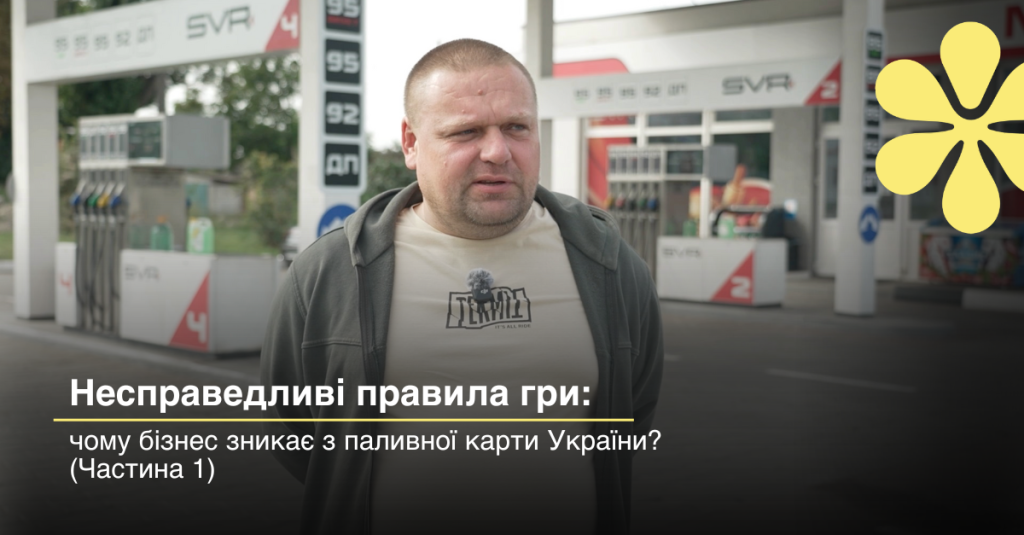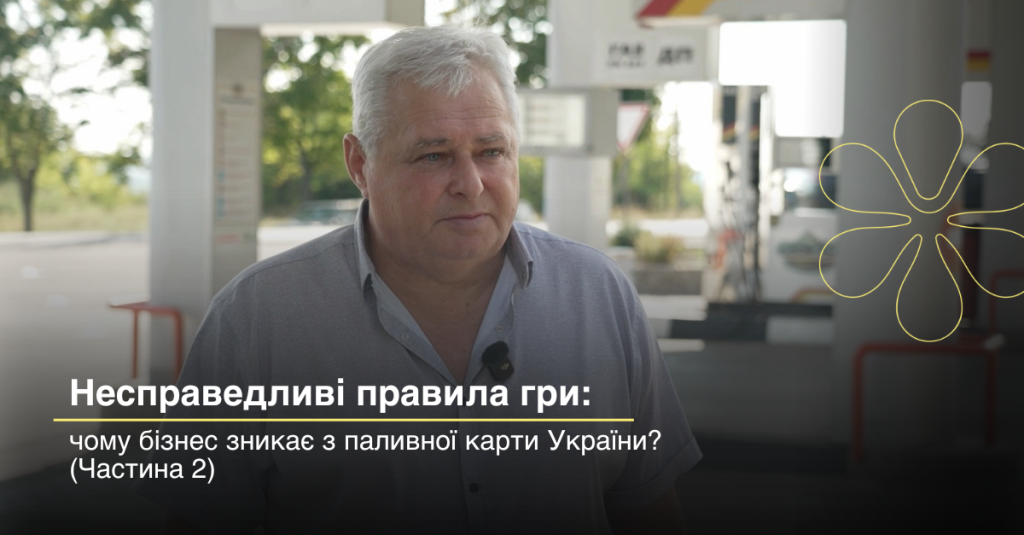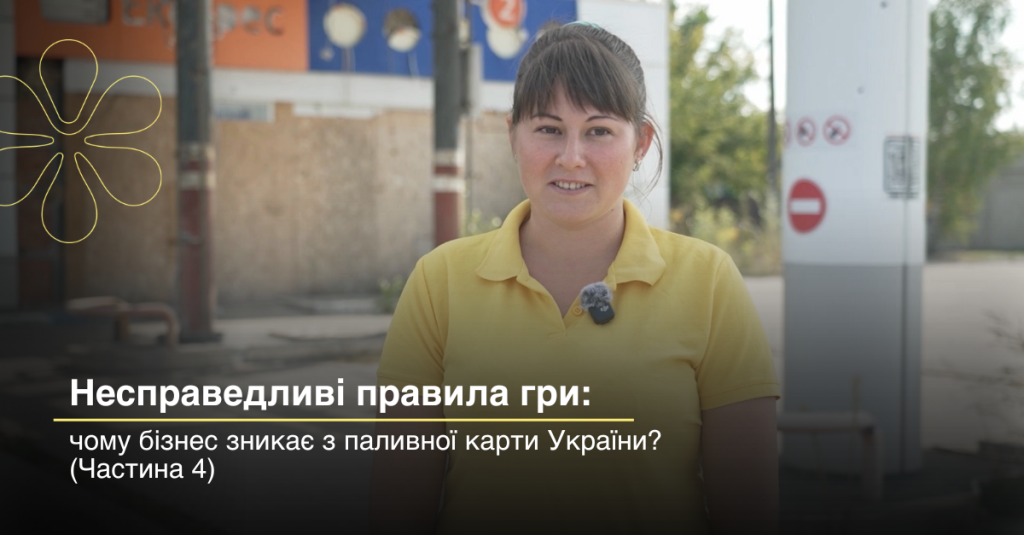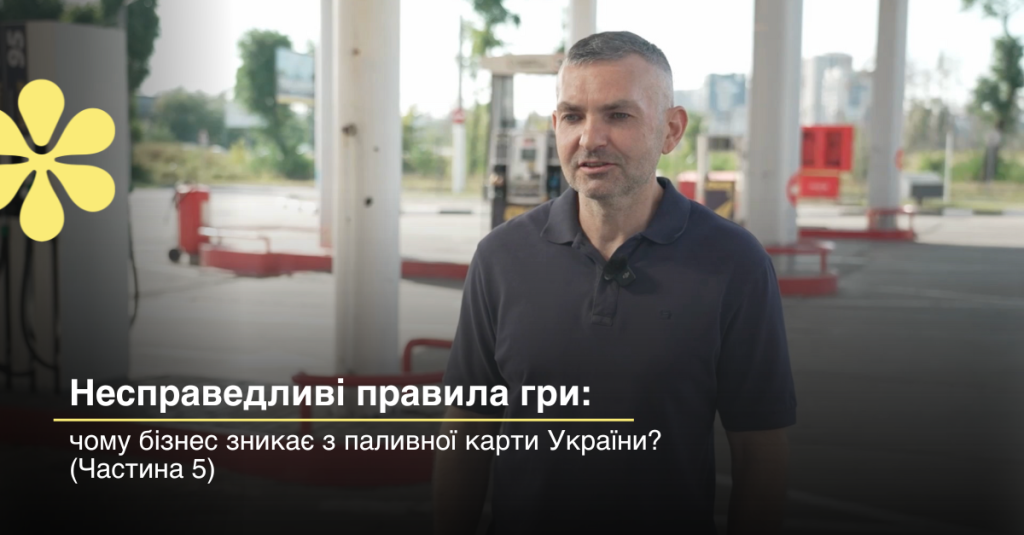The Fuel and Energy Business Association (FEBA) has launched a series of video investigations titled “Unfair Rules of the Game,” dedicated to the critical impact of tax regulation, specifically the introduction of fixed advance corporate income tax payments, on small and medium-sized businesses (MSBs) in the fuel industry.
The project aims to elevate the problems of entrepreneurs to a new level of public and political discussion. These entrepreneurs work in frontline and remote regions where every gas station is not just a business but an essential element of community life support.
Since December 1, 2024, the fixed advance payment has become an unbearable burden. While for large chains it is simply another line in a report, for MSBs, it poses a threat of complete closure.
Below are the first three videos in the series, featuring real entrepreneurs sharing their stories:

PART 1: Ruslan. Taxes Greater Than Income
Small and medium-sized businesses have always been the foundation of Ukraine’s fuel market. It is local operators who ensure fuel accessibility in communities where large chains often do not operate. But today, this segment is on the verge of disappearing.
In the first video, you will hear a frank account from Mr. Ruslan—an entrepreneur working in frontline areas of the Kharkiv region and remote communities of the Poltava region. He shares stories of a business life where every gas station is a fight for survival:
- Taxes are greater than income;
- Stations have to be closed;
- Communities are left without access to fuel.
In this video, we ask the question: is truly identical conditions for everyone fairness? Or are they becoming a mechanism that works against those who hold up the market in the most difficult circumstances?
Watch the first part: “Unfair Rules of the Game: Why Is Business Disappearing from Ukraine’s Fuel Map?”

PART 2: Oleksandr. The Cost of Fiscal Pressure
Ukraine’s fuel market continues to change under the pressure of new tax and regulatory norms. For large chains, this is a challenge, but for small and medium-sized operators, it’s a matter of survival.
In the second part of our video series, we introduce you to the story of entrepreneur Mr. Oleksandr, who operates in the Kharkiv region. Due to unfair tax conditions, he has already been forced to close two gas stations. This means:
- The loss of 14 jobs for people in small communities;
- Losses for local communities that have been left without important infrastructure.
In the video, Mr. Oleksandr frankly explains why small companies cannot withstand the same obligations as large chains and what consequences this regulation has for local communities and the entire industry.
Watch the second part: “Unfair Rules of the Game: Why Is Business Disappearing from Ukraine’s Fuel Map?”

PART 3: Vasyl. The Closure of a Family Life’s Work
How to survive when the rules are the same for everyone, but the opportunities are different?
In the third part of the series, we tell the story of entrepreneur Mr. Vasyl from the Kharkiv region, who maintained his own family gas station for over 30 years. His gas station operated continuously, even during the first days of the full-scale invasion.
But today, this story is an example of how unfair tax rules can put an end to decades of honest work. Due to the requirement to pay an advance contribution of 60,000 hryvnias, the family was forced to shut down the station.
“For large chains, 60,000 is nothing. But for us, it’s our livelihood,” says Mr. Vasyl.
This is more than just an economic problem. It is a matter of fairness, equal rules, and the future of Ukrainian entrepreneurship.
Watch the third part: “Unfair Rules of the Game: Why Is Business Disappearing from Ukraine’s Fuel Map?”

PART 4: Olena. Don’t Take the Last Thing We Have
This story is not just about taxes. It’s a story about those who kept working despite everything.
In the fourth part of the series, we introduce you to Ms. Olena, a gas station operator who has worked for over 10 yearsin a network with a history spanning more than two decades.
Her station survived occupation, shelling, and power outages, but could not withstand the new tax burden.
- One station operated on a generator for over a year to provide fuel to the military and the local population.
- Following the introduction of the advance payment, they were forced to close the station because they started operating at a loss.
Ms. Olena speaks frankly: “We ask you—don’t take the last thing we have.” In some regions, these gas stations are the only ones, and their closure poses a threat to the military and the local population.
Watch the fourth part: “Unfair Rules of the Game: Why Is Business Disappearing from Ukraine’s Fuel Map?”

PART 5: Andriy. Let Us Survive
26 years ago, Mr. Andriy built a gas station on what was an empty lot. Today, it is an entire complex with a store, a car wash, and a generator that provides fuel to the military and local residents.
This gas station has repeatedly come under shelling, with the canopy, roof, and dispensers being destroyed. Despite everything, it continued to operate, becoming an “Invincibility Point.” But now, development has stopped.
Due to the fixed advance payment, income has been reduced so much that even repairs to the damages have had to be put “on hold.”
“Let us survive. A business in a war zone cannot operate under general conditions,” says Mr. Andriy.
While large chains can compensate for losses between their facilities, small operators are left alone to face tax pressure and ruins.
Watch the fifth part of the series: “Unfair Rules of the Game: Why Is Business Disappearing from Ukraine’s Fuel Map?”

